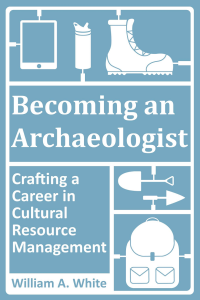 Cultural resource management archaeology was never even mentioned during my undergraduate career. I finished my Bachelor’s degree in 2001 but didn’t learn about CRM until about a year after I’d already graduated.
Cultural resource management archaeology was never even mentioned during my undergraduate career. I finished my Bachelor’s degree in 2001 but didn’t learn about CRM until about a year after I’d already graduated.
Things had changed a little bit by the time I finished my Master’s in 2005. A course on CRM was offered at a nearby university. This was my introduction to CRM regulations, but my field and research methods remained influenced by what I learned in lab classes and field schools.
As a PhD student, I absorbed all I could about the CRM industry on campus and continued doing cultural resources consulting. By that time, I’d already been doing CRM archaeology for nearly a decade and had a pretty good idea of the regulations, field methods, reporting, research, and project management. However, I never learned enough about marketing, proposal writing, budgeting, or the financial side of the industry. I learned very little about these parts of the CRM industry as a graduate student even though they were foundational to all the other parts of historic preservation consulting as a business.
This blog has always functioned as a means of filling the gap between what archaeologists learn in college and what is necessary. I also spend much effort trying to figure out what CRM company owners want their new-hires to know because well-skilled employees are every archaeology consulting firm’s biggest asset. Throughout the years, the folks who hire CRM archaeologists have lamented the fact that their new hires do not know enough about the industry when they are hired. This forces companies to spend public dollars training each new field technician over a period of months, only for up-and-coming archaeologists to job-hop, taking their skills and knowledge to another employer. The process is never ending.
Every company wants to hire archaeologists who are sound technical writers, know historic preservation laws, and have adequate field skills. Unfortunately, university professors are not the ones who can best teach these skills. CRMers are.
This is why my one wish for cultural resource management archaeology in 2019 is for current CRMers to reach out to a university, community college, or vocational school and offer to share their experiences and knowledge with students interested in archaeology.
The Gap between College and Career Remains. However, it can be narrowed in 2019.
Professional archaeologists have been searching for skilled new-hires since the 1970s. They’ve also been lamenting the fact that universities are not cultivating these sorts of practitioners (http://www.succinctresearch.com/why-arent-archaeologists-receiving-better-training-in-college/).
University professors, including me, are at a loss as to how we can craft an education that properly prepares students for archaeology (http://www.succinctresearch.com/an-education-that-prepares-archaeologists-for-archaeology/).
Today, field techs find themselves teaching PhDs how to do CRM. It remains ubiquitous (http://www.succinctresearch.com/archaeology-field-techs-teach-phds-archaeology/).
Universities have been unable to address this morass for over 50 years. This is partly due to the structure and nature of university schooling. It is also partially because there is no ONE way to teach CRM. There is also no ONE ideal CRM context. The way laws are applied across the multitude of land-administering agencies, which makes it hard to prepare university students for all the regulatory constructs they may encounter. I believe the key to preparing college students for working in the CRM industry is through public-private cooperation. This already exists in other fields of study like business, medicine, aerospace, and the hard sciences. This strategy will not always fit neatly in the strictures of academia, but has greater potential for preparing students for the world of archaeology consulting (http://www.succinctresearch.com/addressing-the-archaeology-professor-myth-is-it-possible-to-realize-tenure-track-position/). It will make archaeology seem more like an attainable career than the game Temple Run.
The one thing I want archaeologists to do in 2019—Share their experiences with college students
Students are hungry to know what it’s like to finish school and it is hard to achieve what you haven’t ever seen. Professors are only one type of archeologist. Most do not know CRM and live in a world ruled by grants, committee requirements, and ever lower institutional funding. CRM is similar to academia, regardless of how we want to split hairs, but neither is exactly the same; although, CRM provides many more opportunities to make archaeology a career than academia. I feel like universities need to do an excellent job of preparing PhD students for life in academia, as they are pretty much the only ones who can achieve that goal after graduation, but universities need to be preparing students for work in the private and government sectors at all levels—archaeology students included. I think we can help prepare archaeology students for the “real world” and to become professional archaeologists but it will require commitment on behalf of professors AND the CRM industry.
CRMers need to be included because they are the ones who will be hiring anthropology graduates. It’s in their best interest to help train up-and-coming archaeologists. And, if history is any sort of a teacher, academia is not going to do this job for the cultural resources industry. If anything, universities are struggling to teach any sort of relevant experience as it is. University-sponsored field schools are harder to find as the educational-industrial complex makes it more and more difficult to fund, insure, and execute field schools. Many field schools don’t teach what is needed for an archaeology career anyway. (FYI: If you are a student reading this and want to do archaeology as a career, try and get accepted to one of the few RPA-Certified schools as they are more likely to emphasize workplace skills [https://rpanet.site-ym.com/general/custom.asp?page=RPACertified_Schools]).
In 2019, I would like for anyone who has ever been a CRM archaeologist to change the industry by:
- Contacting faculty at any public university or college and offer to give a talk, forum, or workshop on your experiences in archaeology, OR
- Creating some sort of online content that discusses how you went from a college student to a professional archaeologist.
This is not just for the bosses
It’s always great to hear pearls of wisdom from long-time CRMers, but students can better relate to folks who best know their predicament. I want CRMers of all levels to reach out because you all have valuable information to share:
Archaeological Field Technicians: It is important for students to learn what it’s like to get started in archaeology. As somebody who is closer in age, it will be easier for you to relate to the millennial student life than a Gen-Xer like me or Baby Boomer. It wasn’t too long ago that you were in their shoes. This perspective is important. Students would like for you to talk about what helped you most in your job search? What did you learn in college that has helped you thus far? What do you wish you’d learned in college? They most definitely want to know how you feel about your job. What do you find interesting? Where do you see yourself in the future?
Archaeology Crew Chiefs/Field Directors: As mid-level managers, you probably have the most to gain from this as you’re the ones who will have to turn greenhorn field techs into archaeologists. You can talk about your experiences but you should also try to discuss what knowledge, skills, values, experiences, and character traits you value most in new archaeologists. You should also talk about your graduate school experience (or lack thereof) and how that has helped (or hindered) your archaeology career.
Project Directors/Principal Investigators: These are the industry veterans. We all learn when a good supervisor shares tips of the trade with co-workers, especially new archaeologists. You can share the above information but we really want to know where you feel like the industry is headed and what role skilled employees play in maintaining a successful company. What helped you most, what skills do you value your employees, and what lesson do you try to teach to all your employees? Most importantly, you can tell young archaeologists about the business side of the industry. How are contracts obtained? What is overhead and how does it work? How to you provide for future employment using contracts obtained today? How do CRM companies provide services for their clients and American society?
Company Owners: In archaeology, company founders and owners are among the extreme minority. Starting and maintaining a CRM company is as difficult as getting a tenure-track position in archaeology, perhaps more difficult. Project Directors and PI’s can explain how the industry works, but only company owners can honestly discuss the benefits and pitfalls of starting their own CRM company. Why did you do it? Why would anyone do it? Where would you like your company to be in 10 years? Is there any noble cause to which you would like archaeologists to aspire?
Cultural resource management archaeology company owners are doing what many CRMers think about but few actually try. You are taking control of your own income in a way few of us will never do. I think students can benefit most from hearing your story.
 Online Content Creation Ethics
Online Content Creation Ethics
If you can’t travel to a school or Skype in for a webinar lecture, I would like CRMers to create some sort of online content that can be distributed to aspiring archaeology students. I can’t tell you what to say/do, but I should be directed at the archaeologists of tomorrow. Here are some tips I’ve learned about creating online content in the CRM archaeology blogosphere:
Assume what you post online will live forever— Don’t do something online that you wouldn’t want someone you respect to see. You can’t assume that your online uploads will go away if you delete them. Also, things will change. You may want to update your work sometime in the future. Be judicious in the content you create.
Never “out” a company, co-worker, or client— Do not release the information about companies you are working for, individuals with whom you work, or any other entity that may object to you putting their name on the internet. Keep it short— #TLDR is a real thing. People either skim what you write or fast forward through videos. Just know that. Don’t be offended if they don’t read your whole post.
Don’t do anything that will damage your career— The goal is to inspire students and help guide them towards career success. If you can’t do that, please don’t upload something negative to the internet. It will cost you. Also, there are companies and clients that don’t want you to talk about what you do for a living. Know your company’s social media or online posting policy BEFORE you put something online. If you are working under those conditions, don’t listen to my advice.
Know that your words will be heard by somebody— Google is listening. Your content will find an archaeologist somewhere in the world. You may not get millions of views, but trust that somebody will see your work.
Connect with existing content creators to spread message further— If you want to expand your own bandwidth, distribute your message through the channels created by other archaeologists.
It doesn’t have to be high tech, professional-grade, or perfect— It just has to be pretty good. Use good enough technology that you can get the word out. Microsoft Word, Wi-Fi, and a laptop are more than enough for a blog post. A laptop with a webcam and the headphones that came with your iPhone are good enough to create a video. Do not let technology constrain you.
Be as truthful as possible— The truth will set us free. Tell your message. This is what students are really after.
You will not get paid to do this— Forget what you heard about YouTubers and bloggers paying their bills by making online content. It’s not going to happen in archeology. Trust me. And, forget about asking your company to pay you for doing this public service. They won’t. Trust me.
You will be doing this because: A) It will save you $, time, and stress if you can get quality new hires, and B) You want to help others.
A word on negativity
I’m not asking anyone to sugar coat the realities of being an archaeologist, but I would like everyone to remember that the internet never forgets. Anything you say and do on the internet can and will be used against you. Conversely, anything you say and do on the internet can be used to promote you. People get fired for being negative on the internet all the time. People also further their own online persona by posting positive stuff (Unless you work in politics. In politics it seems like negativity is good publicity).
I am asking for real CRM archaeologists to help aspiring students achieve their dream job, not use your own personal experience in CRM to sh*t on someone else’s dream. If you’ve been a CRM archaeologist, you know the job isn’t all bread and roses. There are some unethical companies that will chew up a field tech and spit her out into a bayou full of snapping alligators faster than you can say “This artifact belongs in a museum!” There are also a host of other CRMers who wish you well and will help you further your career if you are willing to listen. Sometimes these CRMers work at good companies (i.e. those that actually care about historic preservation). Sometimes they don’t.
Your experiences do not speak to those of the entire industry, which is why I am soliciting them. We are all unique. The more perspectives, the better today’s students can make informed decisions for themselves. If you post negativity thinly veiled as truth, it will be a distraction and will make your name synonymous with negativity. Don’t do that. If you don’t have anything nice to say, say it in a way that doesn’t make you seem like a “Negative Norman.”
2019 can be the year of Industry-University Collaboration in Archaeology
Artifact analysis and field schools are the only glimmers of archaeology most students will ever get. There are no archaeology “adulting” classes where students learn: how to find work, how to convince companies to hire them, how to get skills needed for employment, how to cobble a career in a precarious industry, how to cultivate transferable skills that would be useful in other non-archaeology industries, and how to find an outlet for research interests. This will only be possible if industry professionals help convey their experiences and skills. You are creating this class.
None of us knows all of this stuff when we start off in the cultural resource management industry, so it would be impossible to rely on a university anthropology department to teach it. It is also why the entire industry needs to reach out to the factories where young archaeologists are spawned: The university. In 2019, let’s help those we will eventually hire to become archaeologists by sharing our careers with college students.
Let’s get this started. Write a comment below or send me an email.
 Having trouble finding work in cultural resource management archaeology? Still blindly mailing out resumes and waiting for a response? Has your archaeology career plateaued and you don’t know what to do about it? Download a copy of the new book “Becoming an Archaeologist: Crafting a Career in Cultural Resource Management” Click here to learn more.
Having trouble finding work in cultural resource management archaeology? Still blindly mailing out resumes and waiting for a response? Has your archaeology career plateaued and you don’t know what to do about it? Download a copy of the new book “Becoming an Archaeologist: Crafting a Career in Cultural Resource Management” Click here to learn more.
Check out Succinct Research’s contribution to Blogging Archaeology. Full of amazing information about how blogging is revolutionizing archaeology publishing. For a limited time you can GRAB A COPY FOR FREE!!!! Click Here
 “Resume-Writing for Archaeologists” is now available on Amazon.com. Click Here and get detailed instructions on how you can land a job in CRM archaeology today!
“Resume-Writing for Archaeologists” is now available on Amazon.com. Click Here and get detailed instructions on how you can land a job in CRM archaeology today!
 Small Archaeology Project Management is now on the Kindle Store. Over 300 copies were sold in the first month! Click Here and see what the buzz is all about.
Small Archaeology Project Management is now on the Kindle Store. Over 300 copies were sold in the first month! Click Here and see what the buzz is all about.
Join the Succinct Research email list and receive additional information on the CRM and heritage conservation field.
Get killer information about the CRM archaeology industry and historic preservation.




The American Cultural Resources Association (ACRA) is presently taking action to foster collaboration between the Academy and the CRM industry. We realize that this effort will be a long-term ongoing process, but ultimately the entire profession should benefit. To learn more about this effort, please see the ACRA web page at acra-crm.org. In the near future there will be a blog series in ACRASphere related to this issue.
That’s great. I would love to be part of this. Since making the shift to tenure track teaching, I’m constantly looking for ways to connect students with employers. If you are interested, send me an email wawboise(at)msn.com